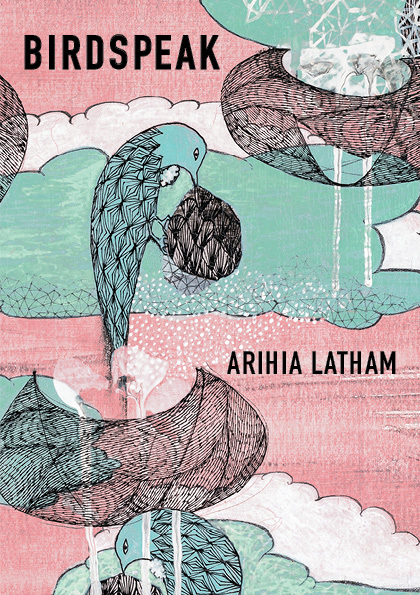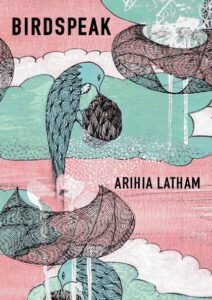Birdspeak

Birdspeak by Arihia Latham. Anahera Press (2023). RRP: $25.00. PB, 100pp. ISBN: 9780473678524. Reviewed by Isla Huia.

The most recent release from Anahera Press, Birdspeak, is Arihia Latham’s debut collection of poetry. Speaking through the generations of her tīpuna in their home of Te Wai Pounamu, to the present day in the lives of her closest whanaunga, Latham shares a relatable tale of growing, rediscovering, and reclaiming her identity in the world, in Aotearoa, and within herself. What makes this collection unique, however, and differentiates it from other works of a similar kaupapa, is the way in which Latham draws upon the pūrākau, the sacred narratives of te ao Māori, to bring together both ancient wisdom and the truths of modern life into one place.
‘Our guffaws made clouds, carrying awkward feelings of being tourists on our own whenua, evaporating them beside the ascending decaffeinated sun.’ (Takapō, p.18)
From the first pages, it feels as though the undercurrent of this collection comes from the mauri of Papatūānuku, Ranginui, and the manu of the inbetween, themselves. Beginning with the well known Kāi Tahu mōteatea ‘Manu Tiria’, the relevance of Latham’s whakapapa to the poems that follow is made clear. While the song describes the work of the digging bird, and heralds the season for planting kūmara, it also refers to Māui inquiring into his own whakapapa and seeking to find the identity of his father. So too does Birdspeak speak to the work of recovering ancestral knowledge, seeking connection, and finally returning to the places our tīpuna once called home. Divided into three sections, the book takes us through the day, from ‘Pūatatangi: Dawn Song,’ to ‘Manu Tiria: Digging Bird,’ to ‘Karanga Porehu: Dusk Song;’ but it also takes us through the experiences that shape being a wahine Māori, right from the distant past, to the future.
‘The droplets of this river hold my mountain / Memory flowers through arteries reddened by the breath of every person with my name turning towards the clay… Gasping for the air that tells us who we are.’ (‘Takapō’, p.19)
Moving from the ancient worlds into today, the poems in this book do not hide the beauty of ancestral practice, but nor do they shy away from the raw challenge of finding the place where those two worlds meet. From loss and abuse to the myriad trials of teenagehood; from phobias to pregnancy, from ambulances to atua—these poems tell the stories of real lives; sometimes floating, sometimes flying, sometimes in darkness, and sometimes in light. In ‘Name Her After Me’ (p.21), a poem dedicated to her mother, Latham describes one such occasion, considering ‘the tikanga of missing a tangi due to unconsciousness,’ (p.21) before ending with the English version of a famous Kāi Tahu whakataukī, saying ‘Face the past e hine, step into the future.’ (p.21) Looking for the avenues within which to comfortably exist in te ao Māori and te ao Pākeha is a journey that is relatable to so many, and so Latham’s ability to describe that discomfort, is a comfort to the reader.
If we were in 1907 I would ask you to be my lawyer
But i would have to whisper in mōteatea
Down the hollowed bones
Of whales
I would have been locked away
Called a witch
The suppression act
Doubling down with the patriarchy. (‘In island stories, the intimacy of distance never lets memory entirely fade away, after Moana Jackson’, p.94)
Throughout this collection, alongside the poems, above the people and within the places, birds are symbols that return repeatedly. Latham weaves the flight of these manu throughout the work, gently placing them as the foundation of this collection as whole. There are throats of birds, there are toroa swooping, and there are blue penguins with ‘the view of a lifetime’ (‘The Wild’, p.29). There is tentative birdsong, there is a duck on a path, there is the question of whether it is native, and there is a pīpīwharauroa waiting on the ātea. In ‘Tui means to bind us together, (p.69), Latham uses the inherently poetic nature of te reo Māori to compare tūī, the bird, and tui, the act of binding together. This stands out as a key concept that underpins Birdspeak as a whole; that for the author, birds represent the histories of our tīpuna, our relationship with the environment, our experience in a contemporary world, and the connections between us, all at once.
In every way, it seems that Birdspeak is both the karanga of the birds and the karanga of Latham herself. It is her, giving us a birds eye view of her world. It is her, taking her readers under her wing.
Isla Huia (Te Āti Haunui-a-Pāpārangi) is a writer from Ōtautahi. Her work has been published in Catalyst Literary Journal and Atua Wāhine: A Collection of Writings by Wāhine Māori, and she has performed at the national finals of the Rising Voices Poetry Slam and the National Poetry Slam. In Ōtautahi she can most often be found performing with Fika Poetry Collective and Ōtautahi Kaituhi Māori.